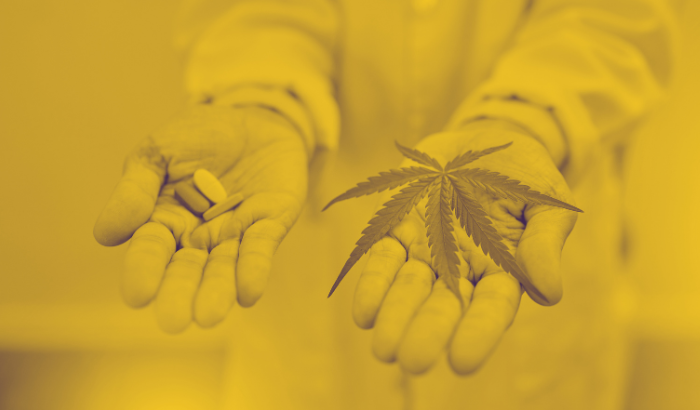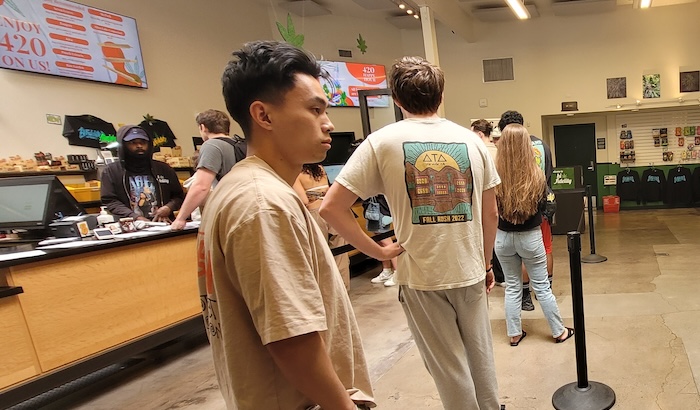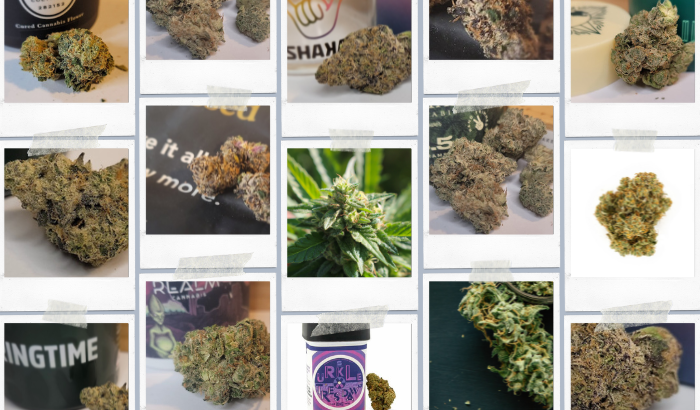
Dear people of 3018, this is what pre-recreational cannabis looked like. At least from my perspective.
2018 — I’m sitting on a couch inside an apartment on the South Shore. Since gentrification took hold in Boston proper, say about eight or so years ago, most of my dealers have retreated to the ’burbs, or more specifically to places such as Malden, Quincy, and Medford outside of the more bourgeois zip codes. Most of the cats I’ve copped from through the years spend a whole lot of time on the homefront, servicing their customers and playing Xbox, and so it makes sense to shack up in cheaper, roomier locales. Especially if they have their own grow ops, but that’s another story altogether.
My South Shore connect is right out of central casting. On a recent trip to his den, which happened to be during the NBA playoffs, his man cave was swollen with friends. Doobies the size of dildos were in full rotation, while his girlfriend served up bowls of pasta to the hungry mob. This time things are much more calm, though; there’s still a spliff in circulation, but he’s with just one other buddy playing Madden. I find a cushion, make myself at home, and puff away while waiting for my turn to speak.
After about 15 minutes, my guy turns to me and gives that look: You are now permitted to talk business. I order up the usual, a $100 bundle that gets me an eighth of flower (he has roughly 20 strains to choose from, each one with its own backstory and usefulness), plus a moon rock the size of a chicken nugget, and an assortment of four brownies and blondies that he advertises are baked by a former Top Chef runner-up. The culinary arrangement sounds official, and my dealer’s selling thousands of these treats a month, so I’m surprised to hear that he isn’t investing in the legal market.
“Fuck that shit,” he says, exhaling while laughing. “I’ve made at least 100k a year for as long as I can remember, and I never had to do a single application with the state. I’m going into online marketing and spam mail—there’s a lot of money there. But I’m not going to sit around and compete with dispensaries owned by the same rich guys from Hingham and Duxbury who I have been selling weed to since high school.
“I made my money. I’m done. I’m getting the fuck out.”
1996 — I’m in a seemingly abandoned sweatshop in Manhattan’s garment district, standing on a giant sheet of plastic that’s unrolled across the floor of what must be tens of thousands of square feet of old factory floor space. The guy with dreadlocks who opened the steel door to let me in is clutching a battered semiautomatic rifle affixed with what I recognize from films as a banana clip. He gestures the nozzle toward the back right corner of the room, where there’s a group of dudes behind a bar surrounded by a cloud of smoke.
I’m halfway to them across the enormous plastic tarp when I realize the potential consequences; in no time at all, these guys could fill me with bullets and roll me up like a caucasian burrito. I have roughly seven grand on me, the spoils of a couple months of slinging weed and also steroids to the meathead athletes at my high school, and this is my big level up. But now I’m slightly worried about getting out of here alive.
To my relief, they’re some of the most cordial guys I’ve met in several years of selling weed. Artillery excluded, they’re even pretty welcoming. They never ask me to sit down—there are no chairs or couches, so maybe that’s why—but they do pass me a blunt, offer a beer, and break down all the costs and options. I’m in and out in less than half an hour, my giant gym bag stuffed with product. I jump into my friend’s car and head back to Queens. My mom is out of town for the next month. The whole time she’s away, my living room’s the neighborhood dispensary.
2017 — We finally have recreational marijuana in Mass. Well, kind of. The majority of folks who made it to the polls last November, on the same day dolts across the nation sent Donald Trump to Washington, voted in favor of cannabis and certain parameters for a subsequent law to be drafted by a special commission tapped by the governor, attorney general, and treasurer. But before said yet-to-be-appointed body gets to handing out retail licenses, it looks like legislators are going to meddle with the will of voters as much as they can.
At today’s hearing, which is apparently for advocates to explain shit to legislators that the latter should already know, State Treasurer Deb Goldberg uses her soapbox to explain, in unapologetic terms, that she wants higher marijuana taxes than are now on deck—they could already hit 12 percent in some municipalities that tack on a local option atop the state’s base and a 3.75 percent marijuana tax—in order to pay for an oversight program, which she says will cost about $10 million a year.
As for how much all those tax bucks could add up to—Mass Commissioner of Revenue Michael J. Heffernan presents an informative Department of Revenue study, noting the jarring newness of such windfalls since the Commonwealth doesn’t tax medical cannabis. Using the rates reflected in the current bill and guidance from legal precedents in Washington and Colorado, Heffernan estimates that first-year revenue will come in at about $64 million, with that number bumping up to $132 million in year two. At the same time, DOR officials say there is uncertainty in their estimates, as they are basically assuming since it is a “market whose use has been heretofore illegal.”
2012 — My cousin calls me crying. “I really fucked up here, Chris.” You don’t say. Without a college degree, his chance of landing a halfway decent gig to pay the bills was hard enough. Now he is about to lose the job he has because his friends and he thought it would be a good idea to clambake in their car outside of Citi Field in Queens. I have comparable pocks on my own personal record, but I’m an independent journalist and have never really had a real job or a background check. Things are different for my cousin; this could impact his entire life.
We’re going to do everything we can to make the charges go away, but it isn’t looking good. My cousin doesn’t have a single prior arrest or conviction; still, his lawyer says that while expungement may come in due time and at a serious cost, his record will at least be tarnished temporarily. Just another statistic, I guess; according to the ACLU, “of the 8.2 million marijuana arrests between 2001 and 2010, 88 percent were for simply having marijuana.” And while my cousin’s white, not all of his friends in the car were, and “nationwide, the arrest data revealed one consistent trend: significant racial bias. Despite roughly equal usage rates, Blacks are 3.73 times more likely than whites to be arrested for marijuana.”
It’s 2012. One has to hope this changes sometime soon. Not just in New York and Mass, but from coast to coast to coast.
2014 — It doesn’t take a soothsayer to see that cannabis is being normalized at relative lightspeed. But for some odd unknown reason, many of my peers and colleagues in the Massachusetts media are acting like prohibitionists deserve a voice in the ongoing debate over medical and recreational weed. And so I write this open letter to reporters about prohibition for WGBH, our local NPR and PBS outlet, hoping that one day eventually I’ll be proven right:
[Dig reporters] universally apply an underlying belief, affirmed to varying degrees by Massachusetts voters twice now, that green is good. Sort of like how nearly everybody to the left of Limbaugh appropriately covers warming oceans and gay marriage these days, with the benefit of the doubt going to progressive, not regressive forces, and to researchers instead of rhetoric. Too many of you enter from the other side, holding marijuana guilty until proven innocent by bureaucrats or your own editorial boards. That’s when you’re not making jokes about the munchies and giggling like a rookie smoker, or shamelessly sensationalizing with stock footage of grandma taking bong hits.
If my approach seems to mock traditional objective ideals, then consider just how glaringly subjective pot reporting has been thus far. Because if outlets really valued objectivity, then they would quote a patient in distress to counter every claim by DPH officials holding back the process. Furthermore, they would harangue politicians who baselessly equate cannabis with opiates, and perhaps even skewer banks for discriminating against caregivers.
2009 — I’m on assignment in Los Angeles, but my first day out here’s dedicated to figuring out how to get medical weed. Everything I’ve read online suggests that it should be quite easy to secure the right permissions, and so I’m scanning the back pages of alternative newspapers. The number of ads for green healing services is stunning, with each one claiming to provide the finest medicine in California, and I have to make a choice. There are essentially two kinds of dispensaries—those which are over-the-top clinical-looking, and a minority which shamelessly embrace the throwback tie-dyed stoner vibe. I choose one of the latter, mostly because they promise to provide a prescription on-site.
A nice guy sitting on a stool inside the front door of the weed spot redirects me back outside and to a wire staircase around the corner. Two flights up, I walk through a door and into what’s allegedly a doctor’s office, but that in reality is nothing more than a few empty folding chairs and a portable card table being used as a receptionist’s hutch. The entire place could be packed up and stuffed into a hatchback in less than a minute; nevertheless, I proceed.
After filling out a form, the woman at the plastic desk asks me to pay her $75 before seeing the doc. I don’t have that much cash on hand, so I ask if there’s an ATM nearby. She counters: “How much do you have on you?” I open up my wallet: “Forty bucks.” “That’s enough,” she says. “Wow, thanks.”
The doctor’s just as lenient. He’s in street clothes and smells like unfiltered cigarettes, but that’s okay with me. I tell him that I’m having trouble sleeping, he passes me a piece of paper, and I bring it back downstairs to the dispensary bouncer. This time I am granted entry, and as I’m walking in, the first thing I see is an ATM machine. I explain to the woman who takes my prescription, the ink still wet on it, that I just asked the doc’s receptionist upstairs if there were any ATMs nearby, and I am told that I was not allowed inside the shop before I had the slip. It turns out that the butt-puffing physician owns the whole operation, and they didn’t want to risk me running off to find an ATM and not returning to get my prescription and spend a grip inside of their candy store.
2018 — I’m at the second meetup of the Massachusetts Cannabis Business Association. Recreational dispensaries aren’t open yet, but the industry has arrived. There’s money in the room, a lot of it; I can feel it in my shoes. The crowd’s comprised of business people, attorneys, and political players, as today’s event—mingling followed by panel discussions about profit and policy—is hosted by the State House News Service and is taking place at the rather fancy Massachusetts Continuing Legal Education center on Winter Place. The start time’s also 7:30 am, a first for any cannabis-related activity in my experience.
Among other speakers, Rob Hunt, a cofounder of the Cali-based Shingle Hill consultancy group, looks into his crystal ball to forecast the soon-to-be-booming industry in Mass. In California, Hunt warns, overproduction is a serious problem, with eight times more licenses to harvest than are needed to meet the supply, and far too many parties overbuilding in hopes that interstate commerce will soon be permitted. “There are ghost towns in the making,” he says, also talking about Colorado. “There will be a decent boom, but there is also going to be a bust.”
As for Mass, Hunt predicts there will be roughly 50 recreational shops open statewide by June 2019. At the same time, the expert says high taxes here will keep the black market cranking, and suggests for the Cannabis Control Commission to prioritize pushing illicit dealers out of existence. “You need to migrate people over,” he says.
Less than one week later, Boston Globe journalist Dan Adams drops a bombshell on us all, reporting that Mass Attorney General Maura Healey ruled “that local officials can unilaterally prohibit cannabis companies for another year without polling residents.” All stemming from a “decision approving an extension of Mansfield’s temporary moratorium on pot shops and other marijuana businesses through June 2019.”
In response, Jim Borghesani, spokesman for Yes on 4 Coalition, tells the press that “the unnecessary ruling is a devastating setback for a voter-approved legalization measure that has already seen significant delays. … The only people who will benefit from Maura Healey’s ruling are the criminals who have controlled cannabis sales for decades.”
Sounds familiar.
UPDATE SINCE THIS WENT TO PRINT: I called my guy on the South Shore on Wednesday, after this story went to print, to ask if he still plans on finding a new line of work since recreational dispensaries won’t open on the target date of July 1. He said he may re-up a few times, but nonetheless will not be swayed by the delay, and is still looking for a new leaf to turn.


























